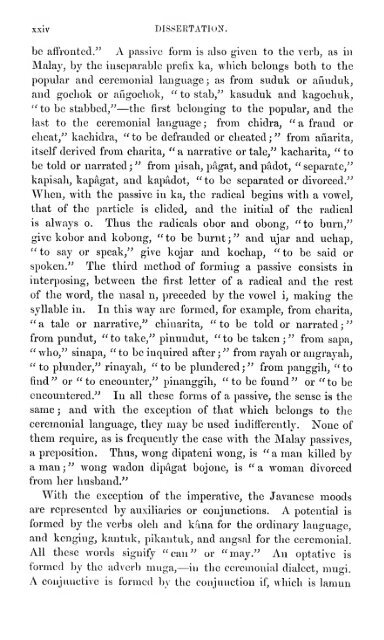A grammar and dictionary of the Malay language : with a preliminary ...
A grammar and dictionary of the Malay language : with a preliminary ...
A grammar and dictionary of the Malay language : with a preliminary ...
You also want an ePaper? Increase the reach of your titles
YUMPU automatically turns print PDFs into web optimized ePapers that Google loves.
XXIV DISSERTATION.<br />
be affronted." A passive form is also given to <strong>the</strong> verb, as in<br />
<strong>Malay</strong>, by <strong>the</strong> inseparable prefix ka, which belongs both to <strong>the</strong><br />
popular <strong>and</strong> ceremonial <strong>language</strong>; as from suduk or anuduk,<br />
<strong>and</strong> gochok or aiigochok, " to stab," kasuduk <strong>and</strong> kagochuk,<br />
" to be stabbed,"—<strong>the</strong> first belonging to <strong>the</strong> popular, <strong>and</strong> <strong>the</strong><br />
last to <strong>the</strong> ceremonial <strong>language</strong> ; from chidra, " a fraud or<br />
cheat," kachidra, " to be defrauded or cheated ;<br />
" from anarita,<br />
itself derived from charita, " a narrative or tale," kacharita, " to<br />
be told or narrated ;<br />
" from pisah, pagat, <strong>and</strong> padot, " separate,"<br />
kapisah, kapagat, <strong>and</strong> kapadot, " to be separated or divorced."<br />
When, <strong>with</strong> <strong>the</strong> passive in ka, <strong>the</strong> radical begins <strong>with</strong> a vowel,<br />
that <strong>of</strong> <strong>the</strong> particle is elided, <strong>and</strong> <strong>the</strong> initial <strong>of</strong> <strong>the</strong> radical<br />
is always o. Thus <strong>the</strong> radicals obor <strong>and</strong> obong, "to burn,"<br />
give kobor <strong>and</strong> kobong, "to be burnt;" <strong>and</strong> ujar <strong>and</strong> uchap,<br />
" to say or speak," give kojar <strong>and</strong> kochap, " to be said or<br />
spoken." The third method <strong>of</strong> forming a passive consists in<br />
interposing, between <strong>the</strong> first letter <strong>of</strong> a radical <strong>and</strong> <strong>the</strong> rest<br />
<strong>of</strong> <strong>the</strong> word, <strong>the</strong> nasal n, preceded by <strong>the</strong> vowel i, making <strong>the</strong><br />
syllable in. In this way are formed, for example, from charita,<br />
" a tale or narrative," chinarita, " to be told or narrated ;<br />
from pundut, " to take," pinundut,<br />
;<br />
" to be taken " from sapa,<br />
;<br />
" who," sinapa, " to be inquired after " from rayah or angrayah,<br />
" to plunder," rinayah,<br />
;<br />
" to be plundered " from panggih, " to<br />
find " or " to encounter," pinanggih, " to be found " or " to be<br />
encountered." In all <strong>the</strong>se forms <strong>of</strong> a passive, <strong>the</strong> sense is <strong>the</strong><br />
same ; <strong>and</strong> <strong>with</strong> <strong>the</strong> exception <strong>of</strong> that which belongs to <strong>the</strong><br />
ceremonial <strong>language</strong>, <strong>the</strong>y may be used indifferently. None <strong>of</strong><br />
<strong>the</strong>m require, as is frequently <strong>the</strong> case <strong>with</strong> <strong>the</strong> <strong>Malay</strong> passives,<br />
a preposition. Thus, wong dipateni wong, is " a man killed by<br />
a man ;<br />
" wong wadon dipiigat bojone, is " a woman divorced<br />
from her husb<strong>and</strong>."<br />
With <strong>the</strong> exception <strong>of</strong> <strong>the</strong> imperative, <strong>the</strong> Javanese moods<br />
are represented by auxiliaries or conjunctions. A potential is<br />
formed by <strong>the</strong> verbs oleh <strong>and</strong> kana for <strong>the</strong> ordinary <strong>language</strong>,<br />
<strong>and</strong> kengiug, kantuk, pikantuk, <strong>and</strong> angsal for <strong>the</strong> ceremonial.<br />
All <strong>the</strong>se words signify "can" or "may." An optative is<br />
formed by <strong>the</strong> adverb muga,—in <strong>the</strong> ceremonial dialect, mugi.<br />
A conjunctive is formed by <strong>the</strong> conjunction if, which is lamun<br />
"

















